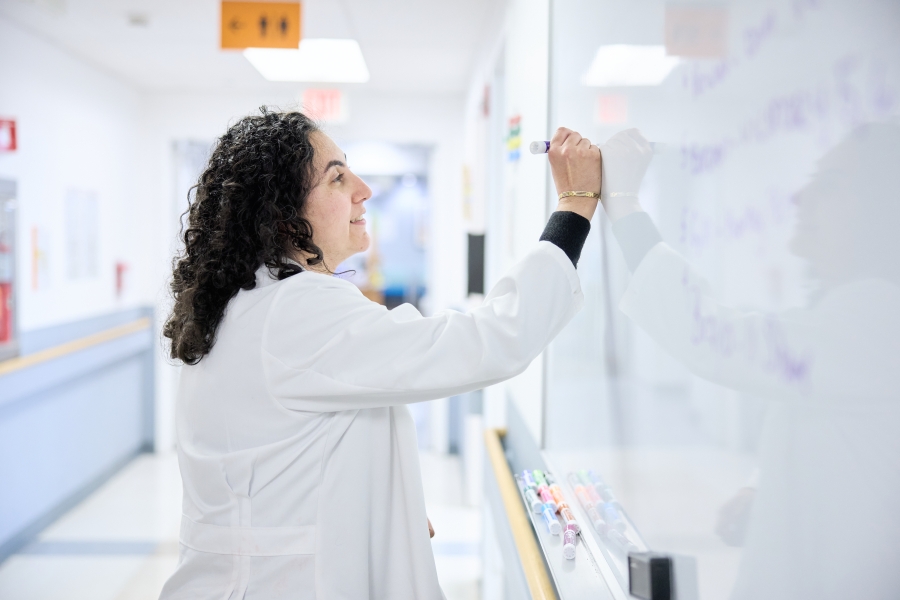I’m a neurologist who works closely with patients who have ALS (amyotrophic lateral sclerosis) through Temple’s MDA/ALS Center of Hope. One of the cornerstones of our center is the support we provide to patients and their families, from the early days of diagnosis through some of the more progressive stages of the disease.
ALS is an emotional journey for the person diagnosed but also for those who care for them. A comprehensive support program, including education and resources, makes a huge difference in the lives of ALS families.
I’d like to take a moment to talk about some of the most common questions we hear from families facing a new diagnosis. And if you have more questions, please feel free to reach out to us at the MDA/ALS Center of Hope. We’re here to help remove some of the challenges for you.
How Does ALS Affect the Nervous System?
ALS is a condition of the nervous system that damages the lining of a specific type of nerve cells. These cells called motor neurons run from your brain to your spinal cord, controlling voluntary movement in your arms, legs, chest, throat and mouth. As the condition progresses, your muscles weaken, causing loss of muscle control.
What Are Symptoms of ALS?
At first, symptoms may be so mild that you don’t notice them. As symptoms progress, you may have trouble with day-to-day tasks.
Common ALS symptoms include:
- Hand, arm or leg weakness
- Cramps or muscle twitches in the hands and feet
- Trouble swallowing, or holding your head upright
- Slurred speech
When the condition is advanced, ALS can lead to:
- Difficulty swallowing
- Shortness of breath
Eventually, symptoms can become life-threatening.
Ways to Manage the Daily Challenges of ALS
ALS can look different from person to person. So managing your day-to-day activities may require some trial and error to figure out what works for you. In the early days, you may be much more active than when your condition is more advanced.
I generally help patients prepare for the journey ahead by providing them with some general guidelines:
Eat Right
Because the condition causes you to lose muscle strength and mass, try to plan for healthy foods full of protein and energy from complex carbohydrates. Initially, you may try to eliminate simple sugars and incorporate the principles of the Mediterranean diet into your meals. This includes:
- Lean protein, such as chicken and fish
- Whole grains and foods with fiber
- Fresh fruits and vegetables
- Nuts and legumes
- Healthy oils, such as olive oil
As your condition progresses, you may have difficulty swallowing or eating certain foods. Develop a relationship with a dietitian or nutritionist who can help you with strategies for nutrition. This may include blending healthy foods and taking nutritional minerals and supplements.
Our ALS Center includes access to a nutritionist who can help you figure out what works for you.
Stay Active
At first, you may still be able to engage in light exercise. If you feel up to it, try to:
- Walk daily
- Swim or take a water aerobics class
- Use a recumbent exercise bike, which has a wider and lower seat than an upright bike
- Do yoga or tai chi
Before you proceed with any activities, make sure it’s okay with your doctor. You may also work with a physical therapist who understands special concerns of people with ALS, and who can help you set your own limits.
You may eventually have to give up these activities, but weekly physical therapy may be a mainstay for you throughout the course of your disease. Movement — even with the help of a physical therapist — can help you maintain flexibility and circulation.
Take Care of Your Emotional Self
Facing a chronic debilitating condition like ALS comes with mixed emotions. You may feel anger, sadness or fear. You may also experience moments of joy and acceptance. It’s important to remember that you’re not alone. You have resources available to you, including your own resilience.
Everyone is different in how they cope with the emotional aspects of the disease. Some people find comfort in daily meditation or prayer. Others find therapy, staying connected with friends and family, or ALS support groups help them through. Find what works for you and understand that it’s okay for your feelings to change and fluctuate, even from moment to moment.
Seek Care at Temple’s MDA/ALS Center of Hope
It’s true that ALS is a debilitating, progressive disease, but experts at our MDA/ALS Center of Hope are focused on helping you through every stage of the disease.
Our multispecialty team works together with you and your caregivers to adapt to the challenges that ALS brings. Each visit to the Center of Hope includes an examination and time with specialists on your team:
- Physicians
- Nurses
- Occupational and physical therapists
- Mental health specialists
- Speech pathologists
- Nutritionists
- Case managers
We’re by your side as a constant resource to help with the physical, emotional and spiritual burden of this condition.
Temple researchers and clinicians are driven to find a cure for ALS and other neuromuscular diseases. We continue to explore new possibilities for patients through our involvement in innovative clinical trials. Conducted through the Temple Neurosciences Center, these research studies give you access to new ALS medications, therapies, assistive devices and technologies. Talk to your doctor about clinical trials that may be available to you.
Get connected with experts who care. Request an appointment with the MDA/ALS Center of Hope or call 800-TEMPLE-MED (800-836-7536).
Helpful Resources
Looking for more information?

